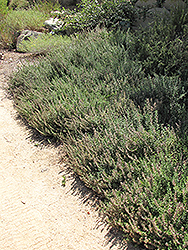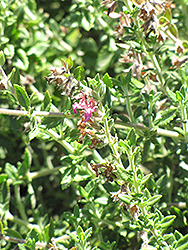It's all about ...
plants

Wall Germander
Teucrium chamaedrys 'Prostratum'
Height: 8 inches
Spacing: 20 inches
Sunlight:
![]()
![]()
Hardiness Zone: 6b
Other Names: Creeping Germander
Description:
A shrubby, woody, clump forming evergreen with attractive fragrant foliage that looks like small oak leaves; lavender to pinkish purple flowers in late spring to early summer; excellent for edging, or small scale groundcover
Ornamental Features
Wall Germander features showy spikes of purple flowers with pink overtones rising above the foliage from late spring to early summer. Its fragrant narrow leaves remain green in colour throughout the year.
Landscape Attributes
Wall Germander is an herbaceous evergreen perennial with a mounded form. Its relatively fine texture sets it apart from other garden plants with less refined foliage.
This is a relatively low maintenance plant, and is best cleaned up in early spring before it resumes active growth for the season. Deer don't particularly care for this plant and will usually leave it alone in favor of tastier treats. It has no significant negative characteristics.
Wall Germander is recommended for the following landscape applications;
- Mass Planting
- Rock/Alpine Gardens
- General Garden Use
- Herb Gardens
Planting & Growing
Wall Germander will grow to be about 8 inches tall at maturity, with a spread of 24 inches. When grown in masses or used as a bedding plant, individual plants should be spaced approximately 20 inches apart. It grows at a medium rate, and under ideal conditions can be expected to live for approximately 10 years. As an evegreen perennial, this plant will typically keep its form and foliage year-round.
This plant does best in full sun to partial shade. It is very adaptable to both dry and moist locations, and should do just fine under typical garden conditions. It is considered to be drought-tolerant, and thus makes an ideal choice for a low-water garden or xeriscape application. It is not particular as to soil type or pH. It is somewhat tolerant of urban pollution. Consider covering it with a thick layer of mulch in winter to protect it in exposed locations or colder microclimates. This is a selected variety of a species not originally from North America. It can be propagated by division; however, as a cultivated variety, be aware that it may be subject to certain restrictions or prohibitions on propagation.
This plant is not reliably hardy in our region, and certain restrictions may apply; contact the store for more information.

